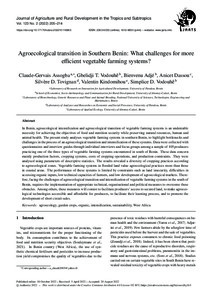| dc.date.accessioned | 2022-10-21T13:09:03Z | |
| dc.date.available | 2022-10-21T13:09:03Z | |
| dc.date.issued | 2022-10-18 | |
| dc.identifier | doi:10.17170/kobra-202210116965 | |
| dc.identifier.uri | http://hdl.handle.net/123456789/14210 | |
| dc.language.iso | eng | |
| dc.rights | Namensnennung 4.0 International | * |
| dc.rights.uri | http://creativecommons.org/licenses/by/4.0/ | * |
| dc.subject | agroecology | eng |
| dc.subject | garden crops | eng |
| dc.subject | organic | eng |
| dc.subject | intensification | eng |
| dc.subject | sustainability | eng |
| dc.subject | West-Africa | eng |
| dc.subject.ddc | 630 | |
| dc.title | Agroecological transition in Southern Benin: What challenges for more efficient vegetable farming systems? | eng |
| dc.title.alternative | Agroecological transition in vegetable farming systems in southern Benin. Lessons from a diagnostic analysis | eng |
| dc.type | Aufsatz | |
| dcterms.abstract | In Benin, agroecological intensification and agroecological transition of vegetable farming systems is an undeniable necessity for achieving the objectives of food and nutrition security while preserving natural resources, human and animal health. The present study analyses vegetable farming systems in southern Benin, to highlight bottlenecks and challenges in the process of an agroecological transition and intensification of these systems. Data were collected with questionnaires and interview guides through individual interviews and focus groups among a sample of 105 producers practicing one of the three types of vegetable farming systems encountered in south of Benin. These data concern mainly production factors, cropping systems, costs of cropping operations, and production constraints. They were analysed using parameters of descriptive statistics. The results revealed a diversity of cropping practices according to agroecological zones. Vegetable farming systems in flooded land value agroecological practices more than those in coastal areas. The performance of these systems is limited by constraints such as land insecurity, difficulties in accessing organic inputs, low technical capacities of farmers, and low development of agroecological markets. Therefore, facing the challenges of agroecological transition and intensification of vegetable farming systems in the south of Benin, requires the implementation of appropriate technical, organisational and political measures to overcome these obstacles. Among others, these measures will consist to facilitate producers' access to secured land, to make agroecological technologies accessible and affordable for producers, to facilitate their learning process, and to promote the development of short circuit sales. | eng |
| dcterms.accessRights | open access | |
| dcterms.creator | Assogba, Claude-Gervais | |
| dcterms.creator | Vodouhê, Gbelidji T. | |
| dcterms.creator | Adje, Bienvenu | |
| dcterms.creator | Dassou, Anicet | |
| dcterms.creator | Tovignan, Silvère Dansinou | |
| dcterms.creator | Kindomihou, Valentin | |
| dcterms.creator | Vodouhê, Simplice Davo | |
| dc.subject.swd | Westafrika | ger |
| dc.subject.swd | Benin | ger |
| dc.subject.swd | Effizienz | ger |
| dc.subject.swd | Landwirtschaftlicher Betrieb | ger |
| dc.subject.swd | Gemüsebau | ger |
| dc.subject.swd | Nachhaltigkeit | ger |
| dc.subject.swd | Interview | ger |
| dc.subject.swd | Wertschöpfungskette | ger |
| dc.type.version | publishedVersion | |
| dcterms.source.identifier | eissn:2363-6033 | |
| dcterms.source.issue | No. 2 | |
| dcterms.source.journal | Journal of Agriculture and Rural Development in the Tropics and Subtropics (JARTS) | eng |
| dcterms.source.pageinfo | 205-214 | |
| dcterms.source.volume | Vol. 123 | |
| kup.iskup | false | |


